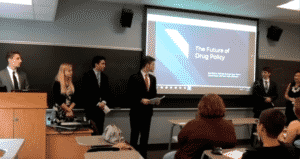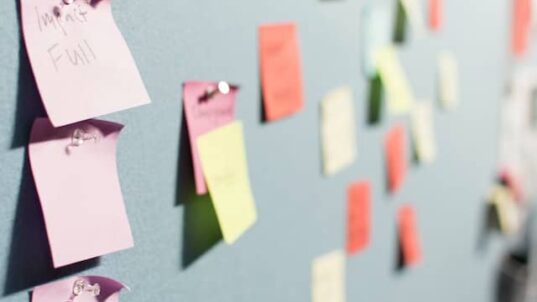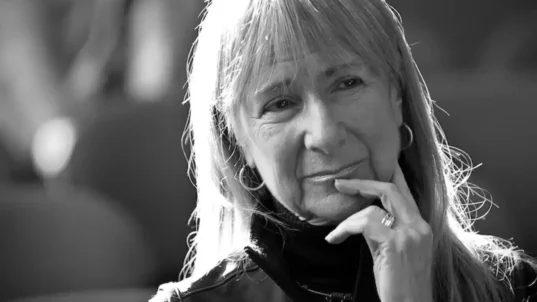 There were 24 sophomores enrolled in the fall 2017 Open Futures (O.F.) course at Lebanon Valley College in Pennsylvania. The students were drawn from a wide variety of undergraduate majors and were there to fulfill part of the general education requirements; “Open Futures” was one of three courses that composed the “Open Minds” connective experience… there were many other “connective” options available. I assigned students to four groups, each of six members. The class met twice a week for 80 minute sessions. The course was split into two parts – the first ten weeks included facilitated group discussions as well as plenary sessions. During these weeks the students considered a number of topics scheduled on the syllabus. The final five weeks of the semester were devoted to group projects with each group preparing an IF-style discussion report on a student-designed public policy topic.
There were 24 sophomores enrolled in the fall 2017 Open Futures (O.F.) course at Lebanon Valley College in Pennsylvania. The students were drawn from a wide variety of undergraduate majors and were there to fulfill part of the general education requirements; “Open Futures” was one of three courses that composed the “Open Minds” connective experience… there were many other “connective” options available. I assigned students to four groups, each of six members. The class met twice a week for 80 minute sessions. The course was split into two parts – the first ten weeks included facilitated group discussions as well as plenary sessions. During these weeks the students considered a number of topics scheduled on the syllabus. The final five weeks of the semester were devoted to group projects with each group preparing an IF-style discussion report on a student-designed public policy topic.
In the first two months of the semester the groups deliberated in class on defined topics taken from Interactivity Foundation reports. Two topics were assigned uniquely to each group from the draft report on the Future of Free Speech and two each from the report on Human Migration, and one topic per group was assigned from the reports on Employment and on National Security – a total of six report section-length topics per group. I had worked closely with I.F. Fellows Mark and Ieva Notturno in preparing the course and benefited from their insights when framing discussion assignments on these reports. (As a sanctuary project panelist, I had also had a hand in the drafting of the report on free speech.) I met the facilitators and note takers from each group before and after each facilitated discussion. Students took turns in these roles, with each assigned to facilitate their group discussion of one topic and to serve as note taker for their group on another occasion. Notes from each student facilitated session were posted to a group-specific discussion thread on Canvas (our online auxiliary platform) and other members of the group were asked to comment or supplement these.
Plenary sessions offered opportunity for whole-class review and intergroup dialogue. I also used plenary sessions for hosting guest speakers and for engaging with additional topics (e.g., Hardin’s “The Tragedy of the Commons,” Locke’s “Letter Concerning Toleration,” recent controversies regarding campus free speech, and discussion of several short video clips concerning migration and refugees). Guest speakers included Mark Cohen, the former Democratic Caucus chair in the Pennsylvania House of Representatives and now a state judge in Philadelphia, Tom Corbett, the former Republican Governor of the Commonwealth of Pennsylvania, and Rodney Smolla, Dean of the Delaware School of Law. Cohen and Corbett, are both alumni and keen to connect with students. The three guest speakers offered very different presentations. Representative Cohen presented a formal lecture on the U.S. Constitution. Governor Corbett spent quite a bit of time in class in less formal discussion with the O.F. students relating his policy experience to their current interests. Dean Smolla’s O.F. classroom presentation was riveting: he drew in the students as active participants while he offered (at the very end of October) a simulation of oral arguments anticipated before the U.S. Supreme Court in the case of Masterpiece Bakeshop v. Colorado. Smolla argued both sides of the case and had several students interrupt him with questions (as he had requested).
In September, students were invited to participate in an I.F. conference at the Newseum, in D.C. Three O.F. participants were among the thirteen undergraduates who traveled with me to that Sept. 21st I.F. conference on the “Future of Public Discussion” and a couple of these students have joined subsequent online discussions facilitated by Mark Notturno. In November, I was pleased that several OF students who had actively engaged with our consideration of the I.F. Human Migration report also participated in a very well attended campus event to discuss the situation of DACA recipients in the light of President Trump’s recent decisions.
The final month and a half of the semester focused on the development of group policy projects. The work was continued in the same groups that had formed for the facilitated discussion phase. Each group identified a topic and sought to craft an I.F.-style discussion report. The groups considered policy possibilities regarding 1. Violent Crime 2. High School Education 3. Substance Abuse and 4. Environmental Sustainability. Even after several weeks working with I.F. reports, students found it hard to avoid reverting to standard academic inclinations of A) viewpoint advocacy and B) summary of expert consensus on their chosen topic. Yet each group succeeded in producing reports that recognized a diversity of viewpoints and a range of policy possibilities that might address the identified area of concern. Each section of the report, while examining one principal policy response, would note other considerations and would observe that for any given policy implementation both positive and negative effects might be identified. The reports were visually appealing, generally well-written, and carefully-edited, benefiting from the diversity of majors and talents available in each group. I held extensive group conferences on each draft report in the last week of November. In the first week of December each group offered a 40 minute presentation and discussion on their report. Some presentations were live-streamed (via Zoom) with IF Fellows able to view and comment in real time. The students took the presentations very seriously, even acquiring business/professional attire for the occasion (something I’d never require). The O.F. students were flattered by the (virtual) presence of the I.F. Fellows, whose reports they had read, and were deeply gratified by the offer to read the final reports and perhaps even use them for discussion in subsequent I.F. activities. I believe it added further value to the experience (and may even have led to more earnest last minute revisions before the submission of the final reports!).
Overall, an excellent semester-long experience both for the instructor and, I believe, for the students. Thank you, Mark and Ieva, and the I.F. colleagues and faculty at other colleges who have all helped with this project.



